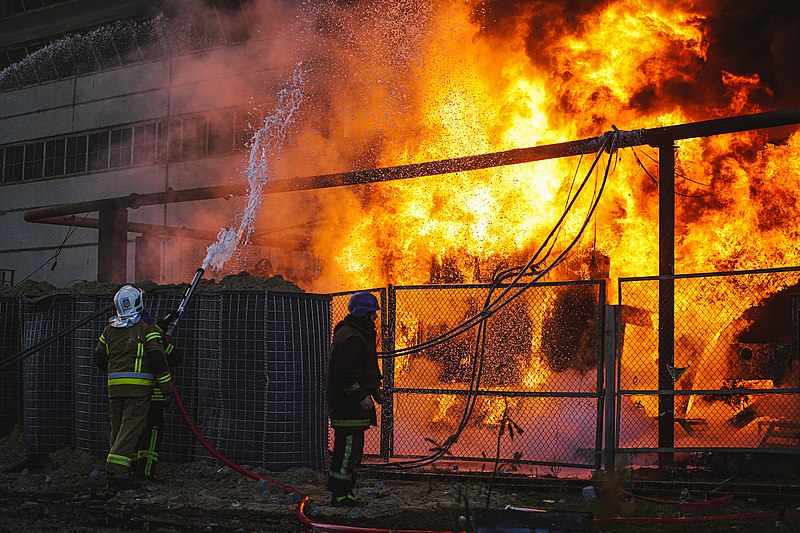The International Energy Agency said the war in Ukraine has led to shifts in energy policies in the world. The agency said the war would ramp up the shift to cleaner energy and away from fossil fuels.
The IEA released its annual World Energy Outlook report Thursday, saying that the war in Ukraine has likely resulted in an increased effort by countries to shift to cleaner energy in the long term. The report added that Russia, which invaded Ukraine on February 24 and is the largest exporter of fossil fuels, was targeted by cuts in natural gas supply to Europe and imports of coal and oil due to sanctions.
“Energy markets and policies have changed as a result of Russia’s invasion of Ukraine, not just for the time being, but for decades to come,” said IEA executive director Fatih Birol.
“The energy world is shifting dramatically before our eyes. Government responses around the world promise to make this a historic and definitive turning point towards a cleaner, more affordable, and more secure energy system.”
The IEA projected that Russia’s supply of internationally-traded energy will drop to 13 percent by 2030 from around 20 percent in 2021.
The report added that prices for natural gas “have reached levels never seen before,” which regularly exceeded $250 for a barrel of oil. As the price of coal rose, oil prices went up $100 per barrel in mid-2022.
With the transition to green energy relying on investment, the IEA projected an uptick in investments from $1.3 trillion today to $2 trillion by 2030, reaching net zero emissions by the end of the decade. The report added that global emissions of fossil fuels will peak by 2025, as coal use dwindles over time, with natural gas demand reaching a plateau by 2030, and the demand for oil off in the middle of the next decade.
On the ground, Ukrainian forces are gearing up for a counter-attack in the Kherson region, with Ukraine’s defense minister saying that the counter-attack in Kherson was posing more of a challenge due to the weather and the terrain.
Defense minister Oleksii Reznikov noted that Ukraine’s southern territory is an agricultural region with water supply channels and irrigation, adding that Russian forces were able to use the environment to their advantage.



 Trump’s Inflation Claims Clash With Voters’ Cost-of-Living Reality
Trump’s Inflation Claims Clash With Voters’ Cost-of-Living Reality  Missouri Judge Dismisses Lawsuit Challenging Starbucks’ Diversity and Inclusion Policies
Missouri Judge Dismisses Lawsuit Challenging Starbucks’ Diversity and Inclusion Policies  South Korea Assures U.S. on Trade Deal Commitments Amid Tariff Concerns
South Korea Assures U.S. on Trade Deal Commitments Amid Tariff Concerns  Trump Allows Commercial Fishing in Protected New England Waters
Trump Allows Commercial Fishing in Protected New England Waters  Pentagon Ends Military Education Programs With Harvard University
Pentagon Ends Military Education Programs With Harvard University  Trump Endorses Japan’s Sanae Takaichi Ahead of Crucial Election Amid Market and China Tensions
Trump Endorses Japan’s Sanae Takaichi Ahead of Crucial Election Amid Market and China Tensions  Ohio Man Indicted for Alleged Threat Against Vice President JD Vance, Faces Additional Federal Charges
Ohio Man Indicted for Alleged Threat Against Vice President JD Vance, Faces Additional Federal Charges  Trump Lifts 25% Tariff on Indian Goods in Strategic U.S.–India Trade and Energy Deal
Trump Lifts 25% Tariff on Indian Goods in Strategic U.S.–India Trade and Energy Deal  Netanyahu to Meet Trump in Washington as Iran Nuclear Talks Intensify
Netanyahu to Meet Trump in Washington as Iran Nuclear Talks Intensify  New York Legalizes Medical Aid in Dying for Terminally Ill Patients
New York Legalizes Medical Aid in Dying for Terminally Ill Patients  Federal Judge Restores Funding for Gateway Rail Tunnel Project
Federal Judge Restores Funding for Gateway Rail Tunnel Project  Trump Backs Nexstar–Tegna Merger Amid Shifting U.S. Media Landscape
Trump Backs Nexstar–Tegna Merger Amid Shifting U.S. Media Landscape  U.S.-India Trade Framework Signals Major Shift in Tariffs, Energy, and Supply Chains
U.S.-India Trade Framework Signals Major Shift in Tariffs, Energy, and Supply Chains  China Warns US Arms Sales to Taiwan Could Disrupt Trump’s Planned Visit
China Warns US Arms Sales to Taiwan Could Disrupt Trump’s Planned Visit  Norway Opens Corruption Probe Into Former PM and Nobel Committee Chair Thorbjoern Jagland Over Epstein Links
Norway Opens Corruption Probe Into Former PM and Nobel Committee Chair Thorbjoern Jagland Over Epstein Links  U.S. Announces Additional $6 Million in Humanitarian Aid to Cuba Amid Oil Sanctions and Fuel Shortages
U.S. Announces Additional $6 Million in Humanitarian Aid to Cuba Amid Oil Sanctions and Fuel Shortages  Trump Signs “America First Arms Transfer Strategy” to Prioritize U.S. Weapons Sales
Trump Signs “America First Arms Transfer Strategy” to Prioritize U.S. Weapons Sales 































